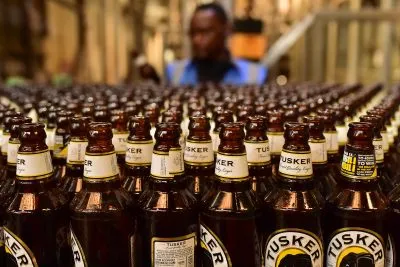The value of Africa’s biggest companies has fallen again this year. But one company – Naspers – is mainly responsible. The total market capitalisation of the 250 biggest listed companies in Africa stood at $505bn on 31 March 2024, down 9% from the $556bn recorded one year earlier and even lower than the $597bn recorded in March 2020 at the height of the Covid-19 pandemic. This continues the overall trend over the past decade, with the figure declining from the record $948bn set in 2015. Back then, it seemed likely that the $1 trillion barrier was on the verge of being broken.
Africa’s 250 biggest listed companies are now worth less than the equivalent cohort in March 2020, when uncertainty over how long the economic impact of the pandemic would last shook confidence in global equities. However, the $51bn fall over the past 12 months almost entirely matches the $48.9bn decline in the value of Naspers.
The company’s fluctuating share price is mainly the result of its involvement in Hong Kong-listed tech and entertainment company Tencent. It bought a 33% stake in the company in 2016, before Tencent’s value boomed, but has since sold part of its shareholding as Hong Kong tech share prices have fallen sharply. Naspers local businesses are a relatively limited part of its total operations, so the big fall in its value over the past two years is not a direct reflection of its South African or even African operations.
Naspers is still the biggest listed company in Africa by some distance; but its lead has been greatly reduced. Its market value has fluctuated wildly over the past few years, reaching a peak of $104.2bn in our 2021 survey, dropping to $49.6bn the following year, jumping again to $80.8bn in 2023 before diving again to $31.9bn this year. The Cape Town-headquartered company mainly operates in the technology and multimedia sector, but has interests stretching from publishing to venture capital. It operates around the world and calculates that its products and services are used by about 2bn people.
Its $31.9bn value is sufficient to keep it a long way ahead of the three South African banks that follow it in our rankings: Absa with $18.4bn; FirstRand with $18.3bn; and Standard Bank Group with $16.4bn. The value of the three banks has fluctuated since last year but none have experienced any falls to compare with that of Naspers. The rest of the Top 10 is mainly filled by other South African firms, such as Capitec Bank, telecoms firm Vodacom Group and miners Anglo American Platinum and AngloGold Ashanti.
Vodacom’s value declined from $14.3bn in last year’s survey to $10.8bn this year, resulting in a fall from fourth to seventh position. However, Vodacom’s fortunes could be on the verge of improving. It recorded a 27% increase in revenue for the final quarter of 2023 to 38.9bn rand ($2bn), with its acquisition of Vodafone Egypt proving a particular engine of growth.
The only non-South African company in our Top 10 this year is Morocco’s Attijariwafa Bank, which moves up from 14th to eighth on the back of a rise in value from $8.3bn to $10.8bn. Although its progress has not been constant, its market capitalisation is on an upward trend; and if the Moroccan and South African economies continue on their current trajectories, Attijariwafa Bank may begin to overtake some of South Africa’s biggest banks over the next four years. One factor that weakens that assumption is the fact that both Moroccan and South African banks are following the same strategy – expanding their operations outside their domestic markets and into the rest of the continent.
Our rankings feature only listed companies, and therefore exclude parastatals and firms held in private hands. Oil companies Sonatrach of Algeria and Angola’s Sonangol would certainly secure a place near the top of our table if they were to seek a listing on an African stock exchange, as would an initial public offering in South African power company Eskom on the Johannesburg Stock Exchange.
Biggest risers
The companies that have made most progress rising up our rankings this year include Morocco’s Banque Centrale Populaire, which moves up from 31st to 20th and from a market capitalisation of $4.5bn to $5.9bn; and South Africa-based Harmony Gold Mining, which jumps 25 places to 24th as a result of its value more than doubling from $2.5bn to $5.2bn. Egypt’s Talaat Moustafa Group climbs from 146th to 50th following a stunning increase in value from $581m to $2.5bn, in large part because of its February agreement with the Abu Dhabi Developmental Holding Company and Modon Developments to work on the $35bn Ras El Hikma City project.
MTN Nigeria falls spectacularly out of the Top 10, dropping from ninth to 35th position, as a result of a fall from $10.6bn last year to $3.7bn in this year’s survey. Nigeria’s biggest telecoms provider’s value had grown rapidly over the previous two years, but at the end of February the company warned that its profits could fall by up to 90% as a result of the devaluation of the naira, despite having 79m customers. CEO Karl Toriola said that allowing the naira to float freely had driven up its operating costs.
Despite the overall decline in the value of the Top 250 African companies, the threshold for entering our rankings has actually risen slightly over the past 12 months. Bank of Africa Côte d’Ivoire needed $239m to secure 250th position in our rankings this year, while Egypt’s Cleopatra Hospital required just $229m to take the same spot in 2023.
Even here, however, the overall trend is downwards, with $394m necessary to take the final position in our table as recently as 2018.
Southern African dominance weakening
Despite the falling value of Naspers, South African companies continue to dominate our table, with combined market capitalisation of $304.9bn, or 60.33% of the total. Given the South African economy’s continued difficulties, it is remarkable that the country’s companies continue to perform as well as they do. The impact of low levels of economic growth over the past two decades is being compounded by poor performance by the country’s parastatals, particularly Transnet and Eskom.
The volume of freight handled by Transnet’s rail and port operations has fallen dramatically, including that of the country’s two biggest earners – coal and iron ore. In addition, erratic power supplies and rationing continues to affect companies in all sectors. Despite these logistics problems, the value of Kumba Iron Ore has declined only slightly from $8.2bn to $7.9bn over the past year, seeing it fall just one place to 16th. Its big fall occurred last year when its value declined from a peak of $14.4bn in our 2022 survey.
Pretoria is banking on greater private sector involvement to attract more investment and engender more competition; but the benefits will not be felt immediately. A combination of power shortages, logistics challenges and high inflation and interest rates are currently putting pressure on businesses. In March, Standard Bank announced that its credit impairment charges had increased by 22% over the past year, despite lending rising just 7%, driving up its credit-loss ratio from 83 basis points to 98 basis points as more companies and individuals struggled to service their loans.
The rest of Southern Africa accounts for just $22bn or 4.40% of our Top 250, with Mauritius and Namibia well represented, despite their small populations. West African companies are valued at $49.8bn in our rankings, accounting for 10% of the total Top 250 market capitalisation, with Nigeria at the forefront with 7.9% – although this proportion is roughly half what might be expected given that Nigeria accounts for 15.3% of the continent’s population. We look at Nigerian companies in more depth and examine the total absence of any Central African companies in our regional rankings.
East Africa is also vastly underrepresented in our table, with the region’s companies listed in the Top 250 valued at just $18.3bn or 3.66% of the total. These figures seem likely gradually to increase over the next few years, with Kenya, Tanzania and Uganda consistently among the fastest-growing economies in Africa and all experiencing rapidly growing populations. Despite growing competition, Nairobi remains the region’s financial and business centre and is likely to provide a growing number of representatives in our table.
We look in more detail at the fortunes of the biggest companies within each region. By far the most-represented sector in our table is finance, which accounts for $195bn or 38.7% of the Top 250’s total value, a big rise on last year’s 30.7%, as Africa’s biggest banks grow on the back of the roll-out of digital platforms and growing banking service penetration rates. Nine of the 20 biggest listed companies are banks and other financial services companies. Companies whose main activity is manufacturing are unrepresented in our table, despite rising wage costs in China and in some parts of Southeast Asia. There are manufacturing success stories in the South African and Moroccan automotive sectors, for instance, but relatively little manufacturing activity anywhere between South Africa and the far north of the continent.
The finance sector is followed by the mining industry, categorised as non-energy materials in our table, with a 20% share of the Top 250; consumer non-cyclicals make up 15.6% and telecommunications 11.6%.
The representation of the consumer non-cyclical sector has seen a big decline from 24% last year, partly as a result of Naspers’ falling value. Other companies operating in this segment include South Africa’s Shoprite Holdings and Clicks Group; plus Nigeria’s BUA Group.
Despite growing strongly, the construction and technology sectors account for shares of just 0.05% and 0.25% respectively, mainly because both industries are dominated by big non-African firms or companies that are too small to secure a place in our rankings.
To subscribe to African Business Magazine and access the full Africa’s Top Companies 2024 rankings and report in the May issue click here
Want to continue reading? Subscribe today.
You've read all your free articles for this month! Subscribe now to enjoy full access to our content.
Digital Monthly
£8.00 / month
Receive full unlimited access to our articles, opinions, podcasts and more.
Digital Yearly
£70.00 / year
Our best value offer - save £26 and gain access to all of our digital content for an entire year!
 Sign in with Google
Sign in with Google 




